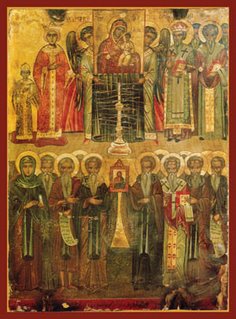Posted two years ago today in Occidentalis:
An interesting quote from Bishop Kallistos Ware (via Pontifications):
At Corpus Christi processions, the Orthodox behaved with marked reverence towards the Latin sacrament. The Chian Jesuit Andrea Rendi recounts how in 1630 the Greek Metropolitan with another Orthodox bishop went specially to a house from which they could conveniently observe the procession, while in front of the building they posted three priests, to cense the blessed sacrament as it passed. On the predominantly Orthodox island of Andros, the Greek bishop himself took part in the Latin Corpus Christi procession, accompanied by his clergy in full vestments, with candles and torches.
+++
May the Good Lord reward those Greek bishops, successors of the Apostles, for their reverence, and inspire in us a similar attitude!
+++
Today is the
second day of the
octave of prayer for Christian unity.
ANTIPHON: That they all may be one, as Thou, Father, in me and I in Thee; that they also may be one in Us; that the world may believe that Thou hast sent me.
V. I say unto thee, thou art Peter;
R. And upon this rock I will build my Church.
[Our Lord called twelve men to be Apostles, and they received power and authority from Him, but only one is listed first, and to that one alone did He entrust the keys of His kingdom. May all of Christendom return to unity with Peter, the rock chosen by the Lord.]For the return of the Eastern Orthodox Christians to communion with the Apostolic See.
Let us pray. Blessed Lord Jesus Christ, who saidst unto Thine apostles, "Peace I leave with you, My peace I give unto you;" regard not our sins, but the faith of Thy Church, and grant unto her that peace and unity which is according to Thy will, Who livest and reignest with the Father and the Holy Ghost, one God, now and ever.
O gracious Father, we humbly beseech thee for Thy holy Catholic Church; that Thou wouldst be pleased to fill it with all truth, in all peace. Where it is corrupt, purify it; where it it in error, direct it; where in anything it is amiss, reform it. Where it is right, establish it; where it is in want, provide for it; where it is divided, reunite it; for the sake of Him who died and rose again, and ever liveth to make intercession for us, Jesus Christ, Thy Son, our Lord.
O God, the Father of our Lord Jesus Christ, our only Saviour, The Prince of Peace; Give us grace seriously to lay to heart the great dangers we are in by our unhappy divisions. Take away all hatred and prejudice, and whatsoever else may hinder us from godly union and concord: that as there is but one Body and one Spirit, and one hope of our calling, one Lord, one Faith, one Baptism, one God and Father of us all, so we may be all of one heart and of one soul, united in one holy bond of truth and peace, of faith and charity, and may with one mind and one mouth glorify Thee; through Jesus Christ our Lord.
+++
Labels: Eastern Orthodox, novena, prayer, unity, video

